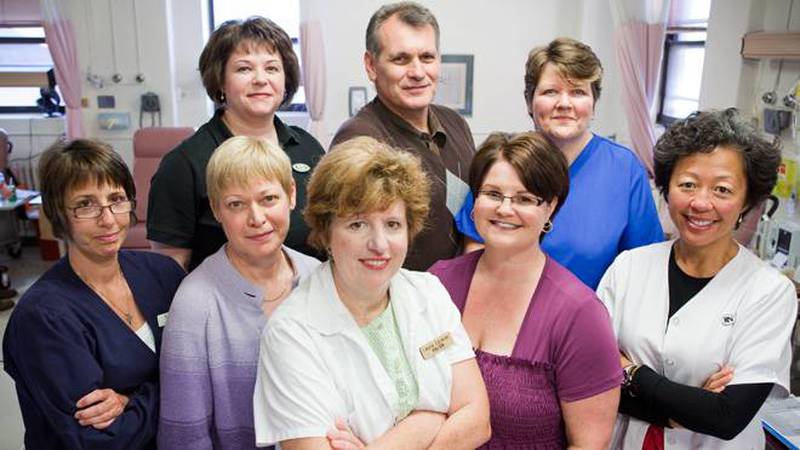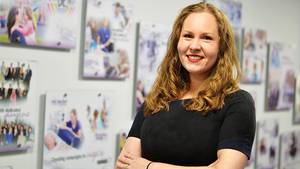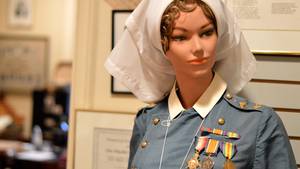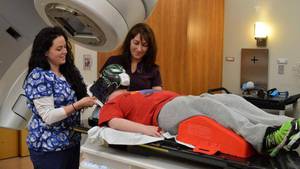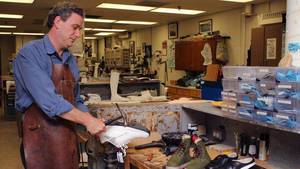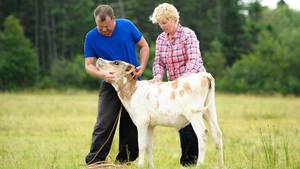The Medical Day Unit at the QEII Health Sciences Centre bustles with activity. It is an ambulatory treatment clinic that is open 365 days a year, seeing about 60-70 patients each day.
“I like to think of it as a little hospital within a hospital,” says Donna Gamble, health services manager of the Medical Day Unit and Hematology Clinic.
The Medical Day Unit treats patients from just about every department in the hospital, including: cancer, palliative care, infectious diseases, and many more. The diversity of these services makes the unit one of the busiest outpatient clinics in the QEII. With its state-of-the-art treatment and care, this unit covers everyone ranging from young adults to the elderly, from diagnosis to supportive care and comfort measures.
The Medical Day Unit is also where patients with hematologic cancers such as leukemia, multiple myeloma and lymphoma receive chemotherapy.
Gamble gives nothing but praise to her staff: “It takes a special kind of person to work here. I have an extraordinary group of individuals.”
In addition to 13 full-time and six part-time registered nurses, the unit is served by physicians, pharmacists, pharmaceutical technicians and other members of the health care team.
Pat Clarke-Gould is one of the nurses on the unit.
“We have very experienced nurses who have worked a long time,” she says. “I’ve had patients say to me, ‘Anybody could be taught to give drugs. You people actually take care of us.’”
This sentiment is echoed by the patients.
“We went in there scared to death…but we [soon] learned that you can live with cancer,” says Jack MacDonald. He was diagnosed in June 2009 with multiple myeloma, a progressive cancer of the plasma cells in the blood. By October 2010, Jack was a regular recipient of Dexamethasone treatments, a steroid injection critical in stopping white blood cells from traveling to damaged areas. In December, he began bi-weekly intravenous therapy. Both treatments were given in the Medical Day Unit.
“As the wife of a cancer patient, you’re thrown into the world of that dreaded word - cancer,” says Trish MacDonald. “When you step up to that desk on the fourth floor, you really need to have a team member greet you with a smile and body language that says, ‘We’re here for you…we know what you’re going through.’”
She holds back tears as she relates her initial experience with the Medical Day Unit. “When we first went to the Medical Day Unit, I sat next to Jack and this wonderful…angel…calmed us both down.”
Gamble says the unit is organized on a self-care model. “We try to partner with the patient so they can make the best choices for their care. We try to equip them with the information that they need in order to care for and protect themselves.”
In Jack’s case, it was Trish who had to take on the caregiver role. She says the Medical Day Unit staff made her feel much more comfortable than she would ever have imagined.
“As a caregiver, you have to be on duty 24 hours a day,” she says. “My immediate reaction was ‘I am not a trained nurse. I can’t do that,’ but they looked at me and said, ‘Yes you can. We’re going to show you how.’ They teach you to do things that you never thought you could do.”
Clark-Gould also comments about the patients and the staff at the Medical Day Unit as well. “We build very strong relationships, especially with our hematology and oncology patients. When their treatment is over and they come back to visit us, we see the benefits of our job. That’s when we really get our reward.”
Jack says the unit staff became like family. “I actually started to look forward to those visits. It was such a warm and safe environment.”
In September 2011, Jack received a bone marrow transplant. After two weeks of daily visits to the Medical Day Unit, he was well enough to return home to Coldbrook, NS. His cancer has since been declared in remission: “I have a second chance at things.”
Jack and Trish both credit the QEII’s Medical Day Unit staff – their professionalism, their experience, their knowledge, and most of all, the positive environment they’ve created.
“We walked in with fear and uncertainty - we walked out with hugs.”
Both Jack and Trish, with support from key members of the Nova Scotia Multiple Myeloma Support Group, are now heavily involved in fundraising for the Medical Day Unit. Their ongoing work will help purchase new equipment and maintain the unit, while the staff numbers stay the same and patient volume increases.
Trish hopes that their efforts will allow the unit to continue their quality of care. “They really are our angels on Earth.”

